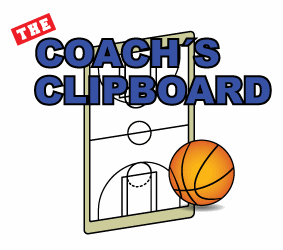Prof Blood and his 1920s Dream Teams
The Honolulu Advertiser
Section E, page 1
Wednesday, November 19, 2003
Disclosure: This page contains affiliate links, which means that Coach's Clipboard receives a small commission (at no cost to you) if you make a purchase using these links.
Prof Blood and the Wonder Teams by Charles "Chic" Hess, Newark Abbey Press
By Michael Tsai
Before the Wizard of Westwood, there was the Grey Thatched Wizard.
Before Bobby Knight and Bob Hurley, before Adolph Rupp and Phog Allen, before any of basketball’s greatest coaches ran so much as a three-man weave, a man named Blood gave a nascent sport shape, power and purpose.
Ernest Blood coached the Passaic, N.J., high school "Wonder Teams" to 159 consecutive games from 1919 to 1925—a record that stands today.
So why haven’t you heard of him?
"Prof Blood is the most overlooked figure in basketball history," says Kailua resident Charles "Chic" Hess, author of the recently released book "Prof Blood and the Wonder Teams."
"He’s a forgotten pioneer, and if he wasn’t in the (Basketball) Hall of Fame, he would have completely disappeared."
Blood helped create the old-school principles of ball movement, court awareness and recognition to which great basketball teams of every level still adhere today.
The Wonder Teams’ record winning streak is still a source of pride in Passaic, but Blood and the unfortunate circumstances that surrounded his tenure faded into history decades ago.
Hess first heard about Blood and his Wonder Teams growing up in hoops-obsessed Philadelphia. As he progressed from playing basketball in high school and college to coaching AAU and small college basketball—he won the NAIA District 29 Basketball Coach of the Year award in 1988 and 1989 as coach of Brigham Young University-Hawaii—Hess found himself more and more intrigued by the mythical figure with the unfathomable record.
Finally, seven years ago, Hess decided to devote his complete attention to finding just how Blood was able to turn a succession of modestly talented teams into a national powerhouse, and why, despite his popularity and success, the principled teacher found himself watching from the outside as the streak came to an end.
Hess’ research took him to Passaic, where he spent long months perusing newspaper archives, listening to rare audiotapes, and examining and re-examining other original source materials.
Gradually, a story began to take shape.
Hess connected Blood’s rapid advancement as a physical education director to the new national focus on physical fitness and ongoing war effort. He traced Blood’s arrival in Passaic, the development of his basketball theories, and his efforts to teach his teams not just how to win but to win with dignity.
Eventually, Hess found that political skirmishes with the Passaic High principal, the school board and a couple of parents brought to an end "a Camelot" of high school basketball.
"It was like going 10,000 feet up and looking down on the situation," Hess said. "From that perspective, I was able to see the big picture and get a real sense of how and why things happened."
Hess spent nearly three years writing the book, drawing inspiration from Leon Edel, a former UH professor who wrote extensively on Irish author James Joyce.
"He told me, ‘Know your material, then sit down and write,’ which is exactly what I did," Hess says.
The result is impressive. A bit like Laura Hillenbrand’s "Seabiscuit: An American Legend," which Hess didn’t read until after he had completed his manuscript. "Prof Blood and the Wonder Teams" is a comprehensive telling of Blood’s personal history and the six seasons his teams ruled high school basketball.
The book includes newspaper excerpts and editorial cartoons from the 1920s as well as game-by-game summaries of the streak.
Though written for a mass audience, "Prof Blood and the Wonder Teams" should have special appeal to basketball fans with an appreciation for history and, as Hess notes, "anyone who has ever coached at any level."
Hess, who holds a master's degree in health and physical education and a doctorate in education, is himself a coach of some note.
He coached Sam Bowie—the former NBA center who holds the dubious distinction of being selected ahead of Michael Jordan in the 1984 NBA draft—for four years at Lebanon High School in Pennsylvania. In addition to the awards he won as coach of BYU-Hawaii, Hess was also recognized as NABC-Kodak National Junior College Coach of the Year in 1991 as coach at Arizona Western College.
Hess teaches health and physical education at Kailua Intermediate.
Hess says as a coach he experienced many of the same things Blood did nearly a century ago—from micro-managing administrators to the hardwood equivalent of stage parents. All of that, he says, just enhances his admiration of how Blood acquitted himself in the face of adversity.
"He was a gentleman," Hess says. "And he deserves to be remembered for who he was and what he accomplished."
Also read what Dick Vitale and others have had to say about this book.
Buy "PROF BLOOD AND THE WONDER TEAMS" at Amazon.com.

